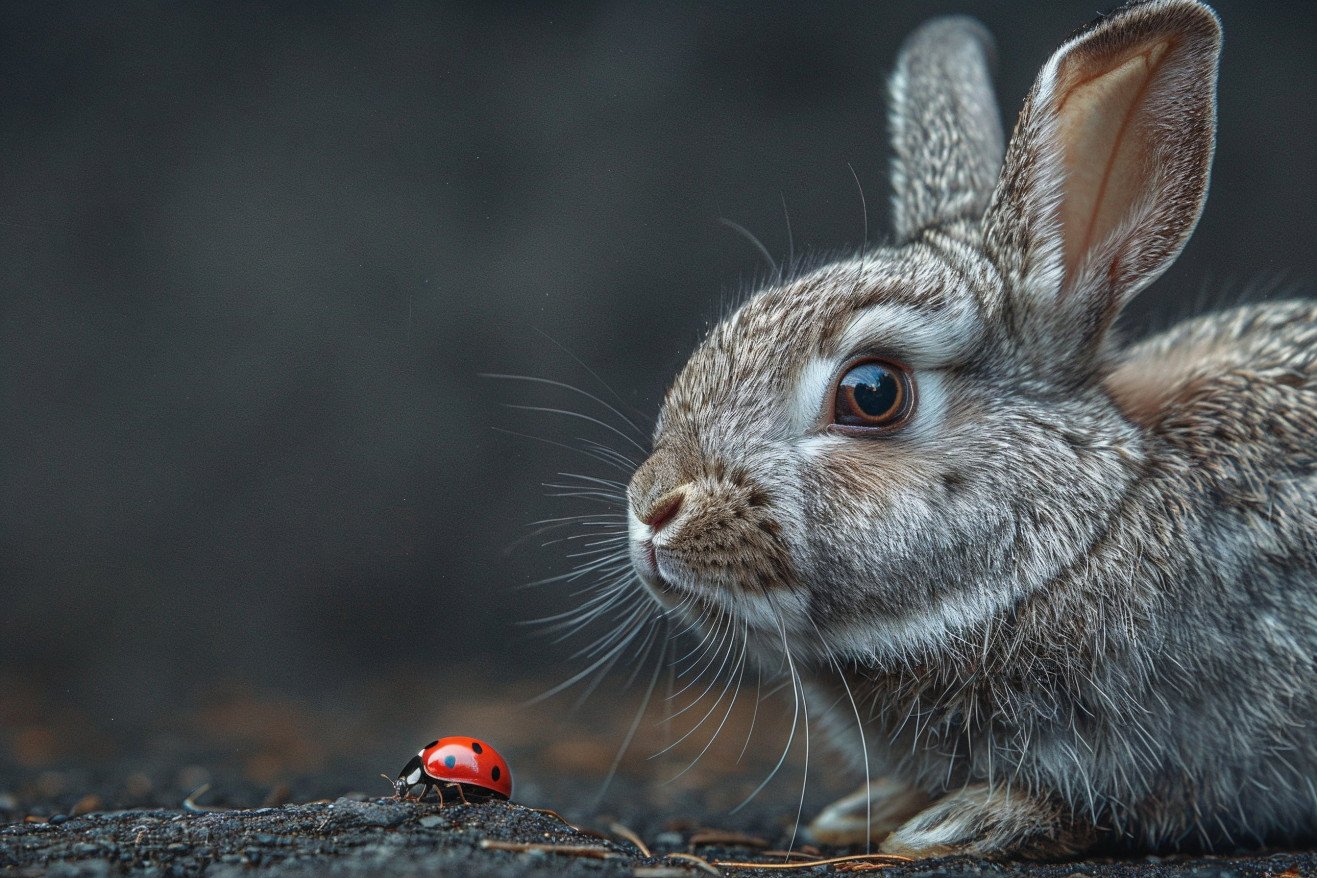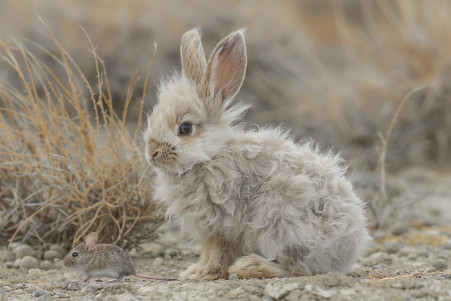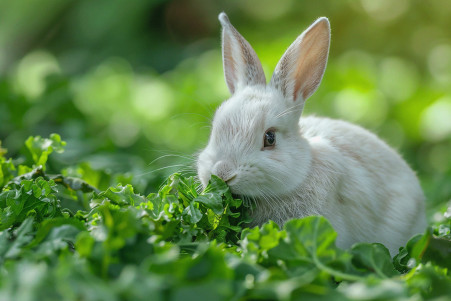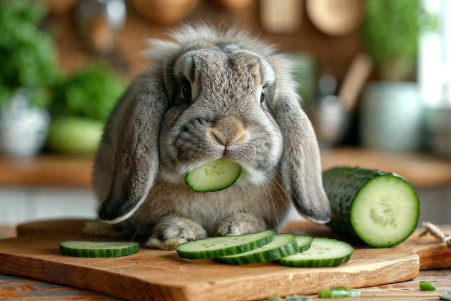Can Rabbits Eat Bugs? What You Need to Know About Your Bunny's Insect Consumption
30 May 2024 • Updated 29 May 2024

If you’ve ever wondered if your sweet pet rabbit can snack on the bugs they might find in their environment, you’re not alone. While rabbits are herbivores and their diet consists mainly of hay, grasses, and leafy greens, they may eat the occasional bug or worm for a variety of reasons, from curiosity to a need for additional protein. Most bugs are safe for rabbits to eat in small amounts, but you should steer clear of feeding them anything that’s too hard to chew or that’s poisonous.
In this article, we’ll take a look at the research on rabbits and their consumption of bugs, including which bugs they’re most and least likely to eat, and the potential dangers of bug consumption. By examining veterinary research, nutritional research, and reports of rabbit behavior, you’ll get a better idea of what to expect when it comes to this interesting part of your rabbit’s diet.
Can rabbits eat bugs?
Wild vs. Domestic Rabbit Diets
Wild rabbits are natural foragers that eat a wide variety of plant-based items such as grasses, weeds, bark, twigs, flowers, and herbs. Most of their diet is made up of these fibrous materials, with fruits and vegetables making up a smaller portion. On the other hand, domestic rabbits need a more balanced diet that includes unlimited hay, fresh vegetables, and a specific amount of pellets.
While wild rabbits may eat some insects or other small animals by accident while foraging, they don't hunt or eat bugs as a primary food source. Their plant-based foraging diet has evolved to meet their nutritional needs. However, feeding domestic rabbits a wild rabbit diet can lead to malnutrition and other health problems. This is because the dietary needs of domestic rabbits are different because of their domestication and living situation.
Do Rabbits Eat Bugs?
Rabbits are herbivores and do not eat insects. According to Rabbit Care Tips, a rabbit will "rarely willingly eat a bug" because insects are not part of a rabbit's natural diet.
Rabbits may inadvertently eat small insects like aphids or caterpillars while eating plants, or parasites like ticks and fleas while grooming. Pets Stack Exchange reports that rabbits may eat crickets and other bugs they find in their yard. However, Bug & Garden says that rabbits are "unlikely to actually eat" insects they chase down, like flies or moths, out of curiosity.
Rabbits tend to avoid spiders and other arachnids, although venomous spiders could be dangerous to rabbits if they bite them. While a rabbit eating a few insects here and there isn't a cause for concern, Rabbit Care Tips warns that insects should not be fed to rabbits in large quantities.
What Do Wild Rabbits Eat?
Wild rabbits are not picky eaters and will eat a wide variety of plant-based foods, including clover, dandelions, grasses, bark, and twigs. They will even eat their own feces to aid in digestion and nutrient absorption. This diverse plant-based diet is essential for wild rabbits to get the necessary vitamins and minerals their bodies need.
While some wild rabbits may eat primarily lawn grass, this can lead to nutritional deficiencies in the long run. It's also important to note that wild rabbits don't seek out or eat insects, worms, or other small animals as part of their natural diet. Instead, they stick to a diet of plant materials to ensure their nutritional needs are met.
Parasites and Worms
Bot flies and house flies can be especially dangerous to rabbits, as they can lead to infections and infestations that can be life-threatening. The House Rabbit Society explains that bot fly larvae can burrow into a rabbit's skin and grow inside the rabbit, leading to infections that are almost always fatal if not treated by a vet. Meanwhile, the common house fly can lay eggs on rabbits, leading to a maggot infestation called "fly strike" that can kill a rabbit in less than a day.
In addition to parasites, rabbits can also contract a number of infectious diseases from insects or contaminated materials, including myxomatosis, rabbit hemorrhagic disease, and pasteurella multocida. VCA Animal Hospitals notes that these viral and bacterial infections can be spread by mosquitoes, flies, and other vectors, which means that outdoor rabbits are at a higher risk. In addition, parasitic infections like encephalitozoon cuniculi and worms can be transmitted to rabbits through insects or environmental contamination.
While the risk of rabbits catching diseases from eating insects or small animals is low, the Institutional Animal Care and Use Committee at Washington State University recommends that proper precautions be taken. Rabbits can also spread certain zoonotic diseases, including pasteurella multocida, cryptosporidium, and mycobacterium avium complex, to humans through bites, scratches, or contact with contaminated materials.
Conclusion: How to Keep Your Rabbit's Diet Healthy
Rabbits are herbivores, and their diet should primarily consist of hay, fresh vegetables, and a balanced amount of pellets. While rabbits may occasionally consume insects or worms, these should not be intentionally fed as a significant part of their diet.
Accidental consumption of bugs or worms is generally safe in small quantities, but precautions should be taken to prevent infestations and potential health risks. Providing a varied, plant-based diet and monitoring for any signs of illness or parasites is crucial for maintaining a rabbit's overall health and well-being.
Working with a veterinarian can ensure that a rabbit's dietary needs are being met properly. By keeping these recommendations in mind, you can make sure that your rabbit is healthy, happy, and content with their natural, plant-based diet.


